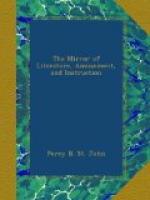(To be concluded in our next.)
* * * * *
OLD POETS
* * * * *
WILL.
Will puts in practice what the will deviseth,
Will ever acts, and Wit contemplates
still,
And as from Wit the power of Wisdom riseth,
All other virtues daughters
are of Will.
LODGE.
* * * * *
LOVE.
Where heat of Love doth once possess the
heart,
There cares oppress the mind
with wondrous ill,
Wit runs awry, not fearing subtil smart,
And fond desire doth ever
master will.
The belly neither cares for meat nor drink,
Nor o’erwatched eyes desire to wink.
Footsteps are false and wavering to and
fro,
The brightsome flower of beauty
fades away,
Reason retires, and Pleasure brings in
Woe,
And Wisdom yieldeth place
to black decay.
Counsel, and fame, and friendship are
condemned,
And bashful shame, and gods themselves
contemned.
Watchful suspect is kindled with despair,
Inconstant hope is often drown’d
in fears;
What folly hurts not, fortune can repair,
And misery doth swim in seas
of tears.
Long use of life is but a living foe,
As gentle death is only end of woe.
WATSON.
* * * * *
PRINCES.
A prince’s safety lies in loving
people,
His fort is Justice (free
from stratagem),
Without the which strong citadels are
feeble,
The subjects’ love is
won by loving them:
Of loving them no oppression is the trial,
And no oppression makes them ever loyal.
SYLVESTER.
* * * * *
GRIEF.
True grief is fond and testy as a child,
Who wayward once, his mood with naught
agrees.
Old woes, not infant sorrows, bear them
mild,
Continuance tames the one, the other wild.
Like an unpractis’d swimmer, plunging
still
With too much labour drowns for want of
skill.
SHAKSPEARE.
* * * * *
FAME.
A lofty subject of itself doth bring
Grave words and weighty, of itself divine;
And makes the author’s holy honour
shine.
If ye would after ashes live, beware
To do like Erostrate, who burnt the fair
Ephesian Temple, or to win a name
To make of brass a cruel calf untame.
KING OF SCOTS.
* * * * *




